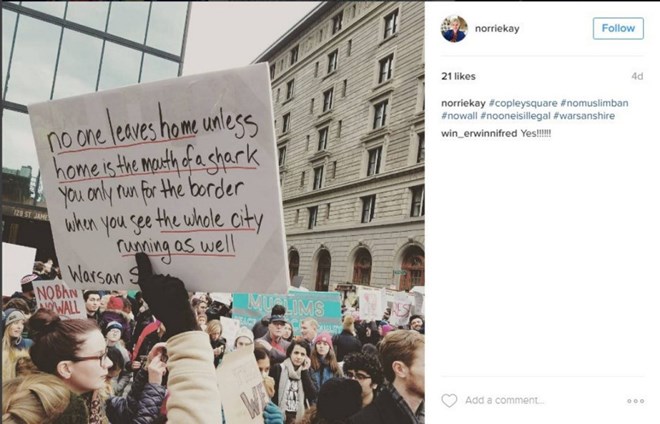
Sunday February 5, 2017

Since she was a child, Toronto poet Faduma Mohamed has turned to words for comfort and resistance — to fight back against racism, to explore her Canadian-Somali identity, to decry stereotypes about people with autism and, recently, about the terrorist attack at a Quebec City mosque:
“Political assassins' narrative
to justify their attack on Muslims
is and will always be
in defending their 'land'
Abroad ...
from the 'War on Terror'.
The fabric of patriotic protection is laced with Muslim blood.
There is no usage of silence.
We can pray silently.
But not rage silently.”
Mohamed’s not alone; she’s one of countless people who, in times of turmoil and upheaval, have turned to the power of poetry to invoke sorrow and anger, to empower and to call for change — a form of resistance that, in the current political climate, Mohamed and others say is thriving.
“(Poetry is) the art behind the pain, it’s the art behind the rage, it’s the art behind the struggle,” she said.
“I feel we’ve always been at struggle, but lately, the intensity of the struggle throughout the world can truly be felt very strongly by a lot of people. And so now, I think poetry is important more than ever.”
From the spirituals sung by African slaves and samizdat publications produced in the Soviet bloc to the verses that helped carry the Civil Rights and anti-Vietnam War movements, poetry has long played a prominent role in fighting back against the powers that be, explained George Elliott Clarke, University of Toronto English professor and Canada’s current Parliamentary Poet Laureate.
“Every human being (turns) to poetry to express what is otherwise inexpressible,” Clarke said.
“We have love poems, we have religious poems, we have nature poems, and so it’s only natural you’re going to have political poems. You’re going to have protest poems, because that’s also an instinctive response people have — someone is striking you, someone is hitting you, you want to tell them, ‘Stop . . .’ And you want to give encouragement to your fellow sufferers, to your fellow and sister oppressed. You want to give them comfort, and you want to call them to arms, you want to call them to resistance. Poetry is there.”
U.S. President Donald Trump’s election and policies, Clarke added, have left no shortage of material to provide inspiration for poets.
“. . . In very short order, those people who feel that the current American administration is not respectful enough of human rights and civil liberties will find themselves turning to poetry — either written by others, or that they may choose to write themselves — to express their fundamental opposition,” Clarke said.
And it’s already happening: as protests against Trump’s refugee ban took place around the world, two phrases popped up on demonstrator’s signs, banners and social media over and over again: “no one leaves home unless/ home is the mouth of a shark” and “you have to understand/ that no one puts their children in a boat/ unless the water is safer than the land.”
They’re lines from “Home,” a poem by London-based, Kenyan-born Somali poet Warsan Shire.
Toronto Poetry Slam founder David Silverberg said it’s not unusual for poets who perform at his group’s twice-monthly events to draw inspiration from major world news, in part because of the intimate, blunt nature of the medium.
“It’s not en masse — not every single poet will write about every single event that breaks — but you know, when Ferguson happened, when Black Lives Matter protests happened at the Pride Parade in Toronto, we saw a boost in poetry reflecting on those themes and being called to action from poets who felt strongly about those issues,” Silverberg said.
The internet — in particular, YouTube — has also propelled poetry’s accessibility and reach to new heights, he added, allowing people who may have previously thought of poetry as only the work of “dead white people” to find content they relate to.
And that ability to relate — to make people connect and understand — is another crucial role that poetry plays in trying times, said Toronto poet Tara Farahani.
“It’s a huge tool in expressing and healing and coming together and I think that’s immensely needed in political climates when we see people of a certain background being targeted,” she said.
“Speeches are great, don’t get me wrong, but with poetry, every word is so intentional, every line you’re writing is intentionally building a story to make an impact.”